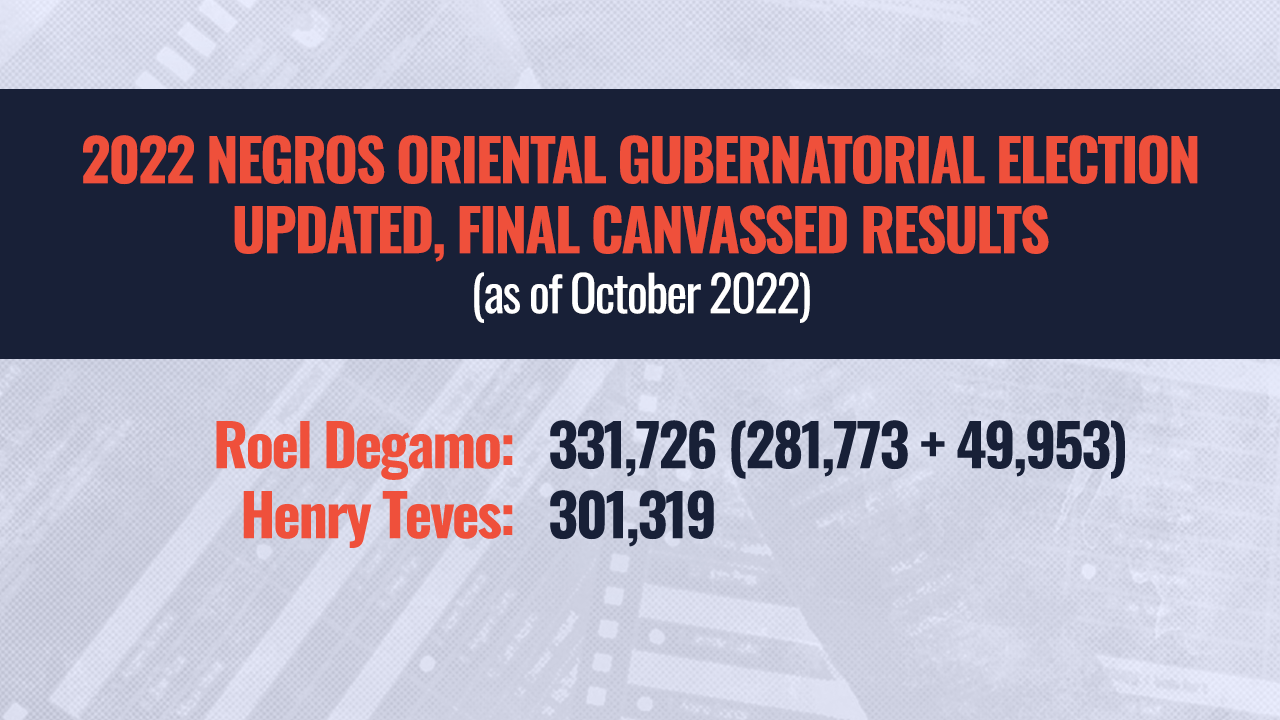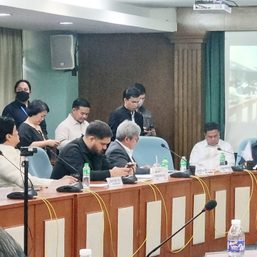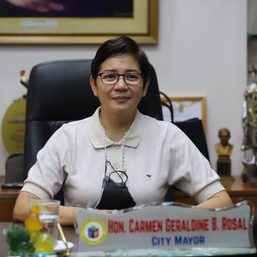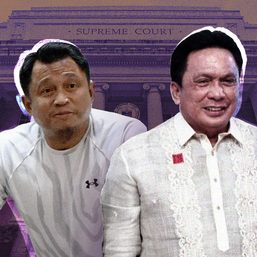SUMMARY
This is AI generated summarization, which may have errors. For context, always refer to the full article.

MANILA, Philippines – The Commission on Elections (Comelec) formally nullified on Monday, October 3, the election victory of Henry Teves in the gubernatorial race of Negros Oriental.
In the process, his fiercest rival, long-time governor Roel Degamo, was declared the true winner of the 2022 election, paving the way for his return to the provincial hall.
It was not an easy road for Degamo, as his journey included a plea to have a nuisance candidate’s votes credited in his favor. But how was that possible?
Background of the case
On October 13, 2021 – around three months before the printing of ballots – Roel Degamo petitioned the Comelec to declare his almost-namesake Ruel Degamo as a nuisance candidate. He alleged that the latter’s surname is not really Degamo but Gaudia, and that the mechanic has never used the name Ruel all his life.
Roel also claimed that a political rival kidnapped and pressured Ruel’s relative into filing a certificate of candidacy on his behalf.
“According to the petitioner, all of these circumstances show that [the surname] Degamo and respondent’s pretended nickname ‘Ruel’ was abused by petitioner’s political rival, through respondent, as to confuse and deceive the true will of the electorate,” the Comelec en banc’s September 1 resolution read.
Delayed resolution
On December 16, the Comelec’s 2nd Division granted Roel’s petition and declared Ruel as a nuisance candidate. Poll commissioners agreed that two Degamos in the race would confuse voters, while also saying that Ruel failed to demonstrate that he had genuine intentions to run for office.
But this decision was not final, and the losing party – Ruel in this case – had the option to appeal his case with the en banc, which is basically the whole of Comelec. He did.
The printing of automated ballots commenced on January 20, 2022, without a Comelec en banc ruling on the case, which meant that Ruel’s name would remain on the ballots. The May 9 elections pushed through with votes for Ruel considered valid.
The initial canvassed result of the 2022 gubernatorial race was as follows:

On May 10, Roel asked the Comelec en banc to resolve his case with finality, and allow votes obtained by Ruel to be credited in his favor.
The case dragged on, until Roel sought the Supreme Court’s help and filed a petition for mandamus on June 26. He said the Comelec’s failure to resolve the case within to 30 to 60 days, as per its rules of procedure, was tantamount to gross and inexcusable neglect. Roel also asked the High Court to issue a temporary restraining order (TRO) to prevent Teves from assuming office on June 30.
In its resolution dated August 16, the Supreme Court said the TRO request was already moot, but granted his petition for mandamus, which ultimately compelled the Comelec to resolve the long-delayed case within 10 days from its receipt of the High Court order.
On September 1, the Comelec finally came out with an en banc resolution, saying that Ruel’s motion for reconsideration failed to raise new arguments that would warrant the reversal of the 2nd Division ruling.
It read: “That while respondent focused so much to persuade us, and emphasized his submitted exhibits, that his surname is also a ‘Degamo’ and not ‘Gaudia,’ he failed to provide proof that he is legitimately known as ‘Ruel Degamo.’”
On October 3, a special provincial canvassing board of the Comelec convened and did the following:
- Annulled Teves’ proclamation as Negros Oriental governor
- Transferred votes obtained by Ruel to Roel
- Amended and corrected the certificates of canvass
- Proclaimed Roel as the true winner of the gubernatorial race
The updated tally of the 2022 Negros Oriental gubernatorial race is as follows:

How did the transfer of votes happen?
The transfer of votes obtained by a nuisance candidate to another aspirant after the elections has a precedent.
In May 2016, Jennifer Antiquera Roxas ran for councilor in Pasay’s first district, but placed seventh in the race that rewarded only the top six vote-getters.
Months before that, she sought the disqualification of Rosalie Isles Roxas, who decided to appear on the ballot as “Roxas, Jenn-Rose.”
The Comelec’s 2nd Division declared Rosarlie or Jenn-Rose as a nuisance candidate in March 2016, but the en banc only affirmed the ruling in July 2016, two months after the polls.
The poll body rectified the election results in April and December 2017, but two original winners of the council race ran to the Supreme Court and said the Comelec acted with grave abuse of discretion.
The Supreme Court, however, stood by the Comelec’s move, saying in June 2019: “The better approach would be to allow the crediting of the votes of the nuisance candidate to the legitimate candidate, who have similar names, regardless whether the decision or resolution of the Comelec became final and executory before or after the elections.”
Magistrates also asserted that all the complications would have been avoided had the Comelec resolved the nuisance petition before the 2016 elections.
“That delay created the unwarranted present scenario. The upcoming election is not a valid excuse for the sluggish disposition of crucial cases for disqualification of nuisance candidates. Any delay on the part of the Comelec increases the probability of votes lost due to the confusion brought about by nuisance candidates,” the Supreme Court said.
More legal challenge
Degamo now gets to assume office, but he is facing at least one more legal challenge. A petition was filed against him in October 2021, seeking to block his gubernatorial bid amid questions of eligibility.
Petitioner Ging Dayupay argued Degamo cannot run for office in 2022 because he was already on his third and final term at the time.
In 2011, then-vice governor Degamo became governor, following the death of his predecessor. He ran for governor in 2013, 2016, and 2019, all of which were successful bids. But in 2016 and 2017. he briefly left his post following separate Ombudsman decisions which dismissed him from office due to alleged misuse of public funds.
In both occasions, he successfully secured a temporary restraining order from the Court of Appeals (CA), resulting in his eventual reinstatement in office.
Degamo was quoted in January 2020 by the Philippine News Agency as saying he was confident that law was on his side and he would be able to run in 2022.
He had cited a Supreme Court ruling which allowed a Camarines Norte governor to serve his fourth consecutive term due to suspensions and dismissals that hounded his years in office.
Rappler learned that the Comelec has not ruled on Dayupay’s petition against Degamo. – Rappler.com
Add a comment
How does this make you feel?















There are no comments yet. Add your comment to start the conversation.